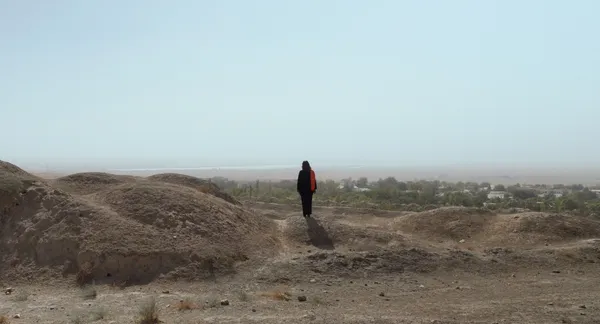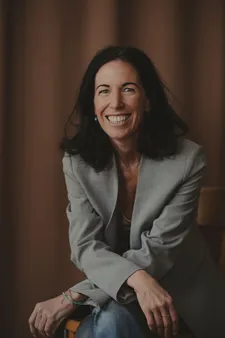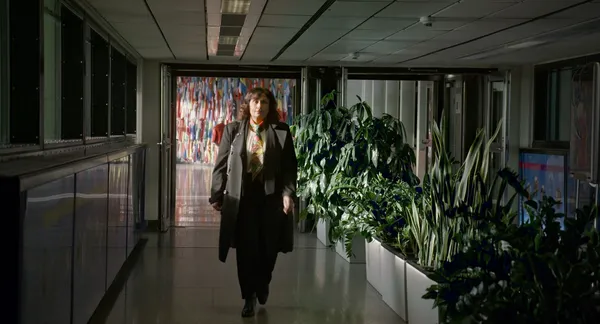 |
| Natalie Halla: 'I think it’s so important with this film to break the stereotypes about women and about men' Photo: Golden Girls Film |
The Last Ambassador dives into the life of Manizha Bakhtari, who was Afghanistan’s ambassador in Vienna when her homeland fell to the Taliban. Natalie Halla follows her practically from day one of the new regime, as she defies them and works to raise awareness of the worsening situation for women and girls in the country. Halla captures Bakhtari’s resilience as she starts a Daughters Programme scheme to give underground lessons to young women being denied an education, at the same time as continuing to fight the Taliban at a political level with the support of her husband Naser Hotaki. The Last Ambassador had its world premiere at CPH:Dox in Copenhagen before also screening at Canada’s Hot Docs. We caught up with Bakhtari to chat about it.
You start almost from day one of the Taliban takeover. How did you manage to get the film up and running so quickly?
Natalie Halla: I don’t depend on a big structure, I have my own camera and I have my brain so I just started filming without even thinking about asking for funding. With this kind of documentary storytelling, it’s so important that you are flexible because otherwise, the story is already gone when you get all the budget together. So it was quick and it was easy because I just took the camera… of course, in terms of quality, you can see parts which I shot and then parts which were short by the bigger team with more money. You can see the difference, but I think in this movie it doesn't matter because it's such a parcel of so many different materials that the audience will forgive it, I hope.
You’ve said you got invited to the Embassy and you had to convince Manizha Bakhtari to let you follow her. Were you concerned that you weren’t going to be able to make the film even at that early stage?
 |
| Director Natalie Halla: 'I really believe in destiny and I cannot just be silent because I'm afraid' Photo: Amina Stelle Steiner |
NH: I was totally sure that I would not be able to make it, so I had nothing to lose. I really wanted to make the film and when I met Manizha Bakhtari, I tried to convince her with all my passion and all my heart but I would have always respected a ‘No’, because if it doesn’t work out then it's destiny and there will be another project. But I was, of course, very happy it went ahead.
Was safety a concern, both for you and Manizha, even though you were in Austria, because she was making so many waves that she was making herself a target?
NH: I was always afraid about that but the fact is that, not only through this film but every day she's outspoken. She's appearing in international media all the time, so she's not going to become a bigger target because of this film. Of course, making this film, I tried to maintain confidentiality by using pixelation and not introducing scenes. I took scenes out where it would have been too dangerous to show a specific place. But she’s in danger generally for the work she's doing and there's nothing I can change about it, unfortunately.
Yeah, but I was wondering, you know, in terms of your own personal safety as well because by extension, in a way by highlighting her, uh, work you are in a, in a way, putting yourself slightly at risk there, as well by extension, and I wondered if that crossed your mind, because obviously, you're a person with your own family and, and all the rest of it.
And what about your own personal safety?
If something would worry me it’s the fact that I have my own family. I really believe in destiny and I cannot just be silent because I'm afraid. I have exposed myself with filmmaking very often in dangerous situations and never has anything happened to me. So I believe that somehow I will be safe and we will be safe. I'm not a threat because in the end, I'm just an advocate through this film for women and girls’ rights. I’m just a spokesman and giving a platform for their rights, nothing more. I’m not creating a specific enemy.
Speaking about women’s rights, the Daughters Programme is a strong element of this film but it must have been tricky to decide how to include that without putting the young participants at risk.
NH: We did everything to keep the her and the images anonymous through many means. She really wanted to be in this movie, actually she wanted us to show her face because she hopes that somebody can get her out of the country, but I definitely decided to pixelate her face. This responsibility cannot be on my shoulders. The safety of the people involved in this movie was very important for me because I'm aware I'm dealing with a topic that can be about life and death.
It must be quite difficult as a documentarian not to become personally involved with these stories.
NH: As a human, with all my documentaries I get very much involved in the destiny of the people. Also the documentaries never let me go. So in this case, for example, I'm also supporting this girl now and I'm having another ‘daughter’ there who I'm supporting. So I became part of this Daughters Programme as the first non-Afghan speaking woman abroad. I convinced the ambassador to try. It works so now I know that every woman can do the same, which is a good thing because it can make the programme so much bigger.
Is it worrying for them that the network of the programme might be infiltrated?
NH: Well the good thing about it is that it really works without a structure. They have a huge network and there’s a huge amount of people there so it's not so difficult to find girls who are interested in participating and the rest is without structure. So just anybody can have contact with a girl and send money through Western Union directly. It does not end up in any bureaucracy and that’s what I like about it. You are just in touch and you give as much as you can give.
The ambassador’s husband is a vital contributor to the film as well. Was he also on board from the start?
It was just Manizha in the beginning and then, with time, other members of the embassy got on board and started to trust me and family members got on board. So this came with time.
It’s important to have him in the film because, perhaps because the Taliban have become such a powerful image for people, it’s easy to forget that it’s a big country with a lot of men who do hold different opinions.
NH: I think it’s so important with this film to break the stereotypes about women and about men. That was one of the things I really wanted to achieve for this movie. There are many strong women who are stronger, maybe, than many in the Western world. Manizha is not the only one, there are many women fighters I met on this journey. Also, the men. Naser is not the only man who thinks that he thinks that way.
Your film also comes as a reminder that arranged marriages sometimes do work out.
NH: It’s the reality. I’m not in favour of arranged marriages but I don’t have to hide the fact that, in this case, it worked out. In general, the way I see the world is not in black and white, I question everything, always, and that's what I try to show.
The film brings across the nature of the trust you built between you when you go to her father’s funeral.
NH: I think in Austria, I became one of her best friends. We became kind of soul sisters. That helped, as a filmmaker, to get close to the scenes that are crucial for the movie. So when her father died, in respect to her, I was thinking, ‘No, I’m not going there, I’m not going to film that, this is so personal’. But she really wanted me to be there and film that.
Were you aware of the family history – that her dad was a famous poet in Afghanistan – going in or was that something that you learned through the course of the film?
NH: I learnt it through the course of the film and it gave this film another layer which makes the film richer. It’s another stereotype that I wanted to break – that Afghanistan is just a war-torn country with miserable life there.
 |
| Manizha Bakhtari in The Last Ambassador. Natalie Halla: 'We became kind of soul sisters' Photo: Golden Girls Film |
It's such a culturally rich country, such a beautiful country and through the poems you can feel it and you can understand the love Manizha has for her country and her sadness about the fact she cannot return there. She and all the other millions of the Afghan diaspora.I wanted to be fair towards this country which is so misunderstood.
Is she still continuing to fight from within the embassy structure?
NH: She keeps on fighting.
What do you hope that audiences take away from the film?
NH: I wish that the audience talk about the story behind this film and spread the world. The destiny of these women and girls out in the world because, for now, it's totally forgotten. So, for me, it’s important to reach as many people as possible and start changing public opinion. It’s so important. Something has to be done. “Don’t recognise the Taliban” is also one of the main messages. So this film should not only be seen by audiences but by decision makers who have the possibility to do something for this country and the people.
I’m always interested in how documentarians begin to slowly step away after you’ve finished a project like this?
NH: I’m still linked to this baby through the umbilical cord so it’s too early to think about it. But it will happen. The baby will start growing. It will go its own way. I will always be there to assist. This will always be one of my movies and one of my babies, especially this one which was the hardest of all my movies. Let’s see what happens because I think this movie will travel to a lot of festivals.
























